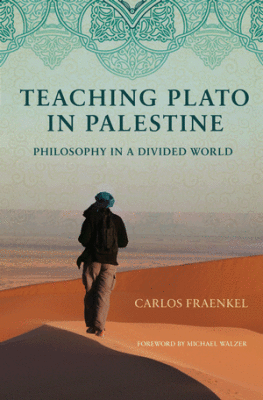Teaching Plato in Palestine opens with a bold thesis: “Can philosophy save the Middle East? It can.” It’s an ambitious statement, but McGill philosophy professor Carlos Fraenkel’s real objective is slightly humbler: he makes the case that philosophy can offer a language to help communities in conflict find common ground to overcome their differences.
Triangulating between philosophy, politics, and religion, Fraenkel makes an appeal to critical reasoning as a basis from which social groups might negotiate tensions. Turning to Plato, Maimonides, and Islamic scholar Al-Ghazali among others, he explores how stereotypes and prejudices can be dissolved through something like a Socratic examination of the assumptions that come with belonging to any given cultural community.
The book is set up in two sections: the first a series of chapter-long vignettes, the second a meatier exploration of his philosophical project and its potential obstacles. The book follows Fraenkel to workshops and discussion groups across four continents over a five-year period – among Palestinian students in Jerusalem; at an Islamic university in Makassar, Indonesia; with Orthodox Jewish skeptics in New York City; with Afro-Brazilian high school students in Salvador; and with Mohawk activists from the Akwesasne reservation that spans parts of Quebec, Ontario, and New York state. Each of these communities lives in acute tension with an adjacent population, embedded in a difficult history of cultural difference.

Teaching Plato in Palestine
Philosophy in a Divided World Carlos Fraenkel
Carlos Fraenkel
Princeton University Press
$27,95
cloth
240pp
9781400865796
The author’s voice is approachable, even chatty, in line with his goal to make critical reasoning tools accessible to non-scholars. Fraenkel’s Socratic approach to guiding workshop discussions – participants make a statement, and he responds with a question that exposes the unstated assumptions underlying what was said – works well to set an example of how such conversations could be used in classrooms, but it gets more than a little grating to read, especially as he runs through the same arguments with each new group.
In spite of the hyperbolic title, his overall argument seems sound – debating those with whom we disagree would likely produce a more self-aware, less prejudiced society. But the problem with his project becomes clear in the chapter he includes about a workshop in Salvador, Brazil, capital of the country’s chronically impoverished Bahia state. High school students there take obligatory philosophy classes and citizens must vote, effectively creating a state-imposed mandatory democracy. But they do so exceedingly cynically, neither convinced that their vote makes a difference in how the country is run, nor that developing their critical reasoning skills will help them build a better life.
After a lengthy debate, he manages to change a few minds, but the episode points to a problem at the heart of Teaching Plato in Palestine. A culture of debate and active citizenry requires people’s active and energetic engagement. Those he wins over were the handful of already-curious scholars, academics, and the philosophically minded he encounters over the course of his travels, but others remain unconvinced. This he breezily dismisses in the concluding chapter, saying simply that students need to start learning philosophy sooner. In practice, building a culture of debate seems a lot more likely if you’re preaching to the already converted. mRb






0 Comments